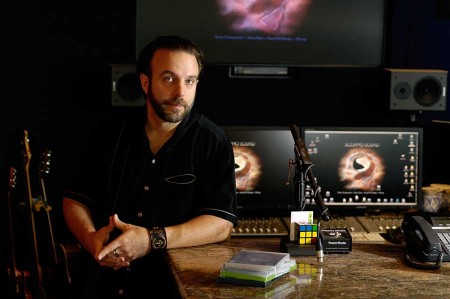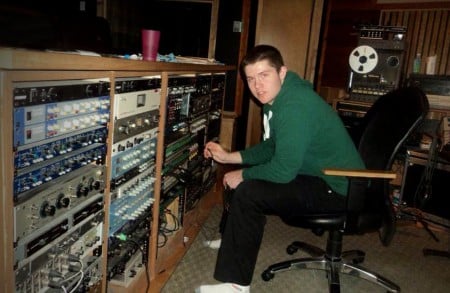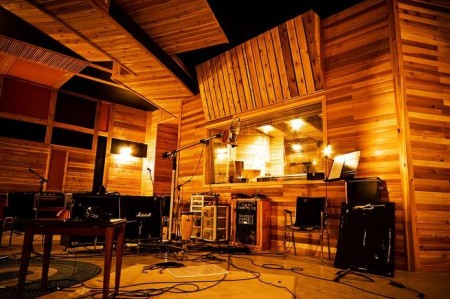Recording Connection mentor Gregory Hainer has carved out a niche for himself in post-production providing Sound Design, Voiceover / ADR, Music Composition, and 5.1 Mixing for Film, Television, Video Games, Location Based Entertainment, and more at Scorpio Sound, his private studio, located in historic Laurel Canyon (Los Angeles, CA). A master of sound, Gregory is often called on by his clients to create sounds that the standard audio post audio house employees can’t do. In his 20 plus years of experience, he’s worked on such major video games as “Batman: Arkham Asylum,” “Guild Wars 2,” “The Elder Scrolls V: Skyrim,” “Dishonored,” and “Plants vs. Zombies 2” as well as feature films such as “Black Hawk Down,” “We Were Soldiers,” “Prince of Egypt” and many others.
Given his wide range of expertise, Gregory brings a rather unique and well-rounded perspective to the table and stands out as an ideal mentor for our students who are interested in audio related aspects of film, video games, or any post production related venues. In the following excerpt from a recent interview, Gregory weighs in on the importance of hands-on learning rather than just getting something conceptually (the “knowing” versus “doing,” paradigm as he puts it). He shares what he looks for in an apprentice candidate and talks about some of the Recording Connection apprentices he has hired on, which has enabled them to earn credits on some very notable projects.
* * * * *

Recording mentor Gregory Hainer
From a client’s perspective, I own the studio, so there is no middle management overhead to worry about because the owner/operator is also the creative head. This means I have the freedom to choose to spend a little more time with my clients in order to get things perfect versus having to be out of the studio by a specific time.
From a teaching/learning perspective, I’ll tell you how it differs from a lot of the other audio college classroom environments: Traditionally, audio skills such as sound engineering, editing, music composition, and mixing have been taught and passed down in a one to one fashion or a master/apprentice relationship if you will. Now, in my experience, you can effectively teach students a certain amount of base knowledge within the typical brick-and-mortar classroom with say 10 – 20 students per class, but you can really only go so far. You can introduce students to general “how to” concepts and the overall approach of the craft, but where I think a lot of the real world value and magic happens is through the hands-on experience and attention I am able to provide to a student here teaching within a real working studio. The “one student to one teacher” model that the Recording Connection uses not only allows me the time I need to spend individually with each student to make sure they are proficient in any skill but also ensures they are ready to enter the job market. To get them comfortable with real world expectations, I allow them to sit in and assist on actual sessions with my clients. I prefer to have students feel like they are bit more a part of the action versus just someone to run and get coffee for everyone.
One thing that I really try to instill in my students is the importance of practicing a skill or workflow as there is a big difference in simply understanding or “knowing” how to do something conceptually and the actual “doing” of it. It is crucial that they actively participate at some point versus sitting there passively taking notes while a teacher lectures. In other words, many students are capable of grasping a concept in an intellectual manner, but if they haven’t actually practiced or performed a specific activity such as engineering a voice-over session, then they often fail to perform adequately during their actual first job opportunity. And unfortunately, they likely will not get a second chance as there are just too many people out there nowadays trying to break into the audio and music side of things.
In addition to the real world studio classroom experience here at Scorpio Sound, a student also benefits from the personal connection aspect of the mentor/apprentice model. Not only is a student exposed to a working expert who has excelled in their field, but if the student performs well, then they already have myself as a professional industry reference when applying for jobs. In addition to this, as I become well-acquainted with a student’s capabilities and demeanor, I often will hire them to work with me on my clients’ projects thus providing them the real world opportunity to build up their credentials. All of these things contribute to making a student much more likely to get hired in the actual workplace than if they just graduated from one of the several more traditional audio schools not really knowing anyone and without any real world experience.
RRFC: What types of services do you provide at Scorpio Sound?
Gregory: Pretty much everything audio related actually. We offer the typical music recording services but are known primarily for our work in the Post Sound related industry for services such as Sound Design, Voice-Over Recording, Editing, Casting and Direction, ADR, 5.1 Mixing and Music Composition. I get quite a few calls for the more unusual or difficult to design stuff that many in-house audio teams can’t quite seem to pull off convincingly such as creating sounds for creatures, magic spells, sci-fi effects, light sabers and the like. But I will also get the occasional call to do the less-fun difficult stuff like cleaning up poorly recorded production audio from a film, or digging out inaudible archival dialogue from excessive background noise, etc. These are more along the forensic audio related tasks, you know, real CSI Miami sort of stuff. I recently learned that the director of an Independent film I worked on (“The Insomniac”) said in a film festival interview that I basically saved his film by fixing the previously unusable production audio, and along with the other sound design, mixing services and creative input, that I was the one person who contributed most to his film. I couldn’t have imagined a higher compliment from a director and that makes me think that all the personal one-one on attention and care I give to my clients and students is worth the effort.
RRFC: You mentioned that you had a few apprentices working on some of those AAA Video Game projects and that actually received credit. Was that Andrew Holscher and Will Dawson?
Gregory: Yes. Both Andrew and Will have worked on some of those. They got credit and they got paid. Will has also worked on a couple of other previous video games for me as well. Will is a great guy and his attention to detail and professionalism is exceptional. He not only has an unusually high degree of integrity but he is fun to hang out with. I recently invited him to go sailing with some friends of mine and the director of a film whose mix he sat in on. Andrew is also a real solid guy and has his hands in several aspects of audio and music. He’s the real gamer type, so he was super excited to be able to contribute to a video game project.







